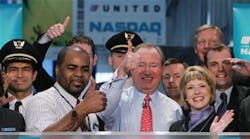United Airlines' new stock fell sharply from its initial valuation Thursday but the value remained more than double what the carrier had forecast, marking a successful debut on the Nasdaq Stock Market.
On the company's first full day out of bankruptcy since December 2002, its new shares declined $4.11, or 10.3 percent, to $35.89 in afternoon activity from the $40 price established in preliminary trading earlier this week. Volume was fairly heavy, with some 3.5 million shares traded.
"Today marks a new chapter for United, and it starts from a renewed position of strength," said CEO Glenn Tilton, who opened the Nasdaq in a live remote hookup from O'Hare International Airport.
Record-level oil prices and competitive threats from discount airlines cast a shadow over United's exit from bankruptcy after 38 months. But the strong interest in United among banks and now investors amounts to a financial vote of confidence.
"It kind of belies the contention that there is a shortage of domestic capital available for the airline industry," airline consultant Robert Mann said of the interest in United's stock and the earlier oversubscription to its exit financing.
The old, over-the-counter shares in parent UAL Corp. were canceled.
The largest shareholder in Elk Grove Village-based carrier is the Pension Benefit Guaranty Corp., by virtue of the bankruptcy agreement in which United dumped its defined-benefit plans on the federal agency and in exchange gave it 20 percent of the roughly 125 million shares issued.
The PBGC has signaled its intent to sell half of its approximately 25 million shares to raise cash to help pay for pension benefits, making it one likely source of Thursday's selling.
Other big winners from the stock debut are Tilton and 400 United executives, who were granted 8 percent of the stock under a controversial portion of the airline's reorganization plan. While they cannot begin selling the shares for six months, the first-day trading valued their approximately 10 million shares at about $360 million.
United slashed its annual costs by about $7 billion during the bankruptcy makeover in an attempt to return to profitability for the first time since 2000. It now has about 30 percent fewer employees, 20 percent fewer airplanes and 20 percent lower operating costs, excluding fuel, than it did when the restructuring began on Dec. 9, 2002.
___
On the Net:
News stories provided by third parties are not edited by "Site Publication" staff. For suggestions and comments, please click the Contact link at the bottom of this page.






